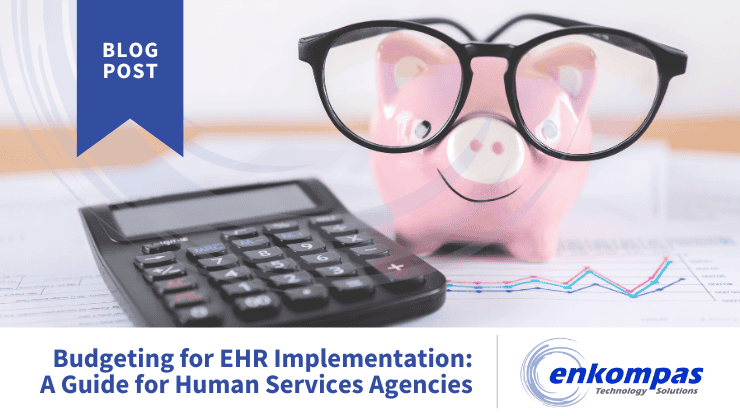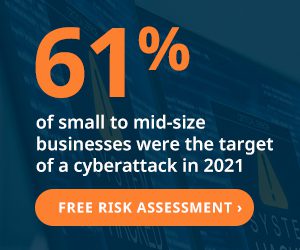Electronic Health Record (EHR) systems have become essential tools for Human Services Agencies, enabling better client care, improved data management, and enhanced reporting capabilities. However, budgeting for EHR involves careful short- and long-term financial planning, which can be challenging for agencies. Organizations must commit to sustained investment in both technology and staff resources to ensure ongoing success and value realization.
This guide outlines key considerations for budgeting for EHR – both the initial implementation and long-term maintenance, helping agency leaders develop comprehensive budgets which will ensure ongoing success.
Understanding Total Cost of Ownership
Before diving into specific budget items, it’s crucial to recognize that EHR costs extend far beyond the initial software purchase. The total cost of ownership (TCO) includes implementation, training, hardware, ongoing maintenance, and potential system upgrades. Agencies should plan for a minimum of 3-5 years when calculating TCO.
Budgeting for Initial EHR Implementation
Costs for initial EHR implementation fall into three major buckets: licensing of the EHR software itself, the right hardware to operate the software, and professional services for setting up the system and managing the project. Here are a few details to keep in mind for each of these three cost areas.
Software Licensing
Experience Growth in Your Company Through EHR Optimization
The most obvious cost for the budget for EHR is the EHR software itself. Pricing models typically fall into two categories:
- Perpetual licensing with a large upfront fee
- Subscription-based (SaaS) models with monthly or annual payments
Consider negotiating multi-year contracts to lock in favorable rates and include provisions for adding users as your agency grows. And keep in mind that software licensing includes the following:
- Base EHR platform license
- Per-user licensing fees
- Module-specific, add-on licenses (e.g. scheduling, billing, reporting)
- Development/testing environment licenses
Hardware and Infrastructure
When budgeting for EHR, keep in mind that even cloud-based systems require appropriate hardware. Consider all of the following while developing your budget:
- Workstations or laptops for staff
- Mobile devices for field workers
- Network upgrades to ensure reliable connectivity
- Security hardware (firewalls, encryption tools)
- Backup systems and disaster recovery solutions
And don’t forget to consider setup costs for server hardware or cloud hosting, depending upon which route you take.
Professional Services
Implementation services often represent 40-50% of initial costs. Consultants with experience with Human Services Agencies and expertise in EHR technology and Organizational Change Management (OCM) will save you time, energy, and frustration by helping you ensure your EHR initiative is done right the first time.
Consultants apply their know-how across a variety of critical processes, including:
- System configuration and customization
- Data migration from legacy systems
- Interface development with other agency systems
- Project and Communications Management
- Testing and quality assurance
- End-user and super-user training programs
- OCM support
In addition, EHR consultants can help you stay on course with your EHR initiative with minimal disruption to your staff and the services they deliver in your community. However, you may also need to consider whether or not you will need to budget for overtime pay during implementation and/or come up with a plan for temporary staff coverage to allow for employee training.
Budgeting for Ongoing EHR Costs
Once your organization completes the initial implementation of the EHR, a lot goes into keeping it running smoothly and apace with your organization’s changing needs. The system itself will need to be maintained, and new hires and existing employees alike will need ongoing training. Further, your agency must remain vigilant around cybersecurity and regulatory needs, due to the sensitivity of your client data. Here’s a breakdown for those areas.
Annual Maintenance
Plan for recurring costs such as:
- Software maintenance and support fees (typically 18-22% of license costs)
- Hardware maintenance and replacement
- System upgrades and patches
- API access fees
- Technical support resources
Staffing and Training
Don’t neglect these elements, as your EHR system will only be as effective as your users are.
- Dedicated IT staff or contracted support
- Ongoing user training for new features
- New employee orientation
- Super-user program maintenance
- Workflow optimization and process improvement
Compliance and Security
To keep your data secure and to maintain regulatory compliance, budget for the following:
- Regular security assessments
- HIPAA compliance maintenance
- Annual privacy and security training
- Audit preparation and response
Best Practices for Budgeting for EHR Implementation
With the checklists above in hand, you’ll be well-armed to develop a solid budget, where every need has been accounted for. In addition, we offer you the following budgeting best practices to help make the process – and the expenses – as manageable as possible.
1. Build in Contingencies
When implementing any organization-wide program, it’s almost impossible to account for every possible element that will be impacted at your organization. Therefore, we recommend including a minimum 15-20% contingency fund for:
- Unexpected technical challenges
- Additional customization needs
- Extended training requirements
- Integration issues with existing systems
It’s better to be prepared than caught off guard.
2. Phase Your Implementation
Consider a phased approach – and not just to spread out costs. Among other things, rolling out your EHR in phases will allow you to detect and correct any problems – with forms, workflows, and so on – before the problem can impact your entire organization. Here are some options for phasing your implementation.
- Start with core functionalities
- Add advanced features over time
- Roll out by department or location
- Align phases with funding cycles
3. Leverage Available Funding Sources
Due to the pressure agencies are under to implement an EHR to comply with new regulations and payment models, various options for help in funding your EHR implementation are out there. Don’t limit yourself; Explore multiple funding streams:
- Federal grants and initiatives
- State innovation programs
- Private foundation support
- Community partnership opportunities
4. Monitor and Adjust
Finally implement strong financial monitoring, including the following elements:
- Track actual versus budgeted costs
- Monitor return on investment metrics
- Adjust budgets based on usage patterns
- Document cost savings for future planning
Sample Budget Framework
Apply the best practices above and create a detailed budget spreadsheet that captures everything you need in one place:
- One-time implementation costs
- Monthly recurring expenses
- Annual maintenance fees
- Staff training and support
- Hardware replacement schedule
- Contingency funds
The Importance of Nailing Your EHR Budget
Successful EHR implementation requires thorough financial planning that goes beyond initial purchase costs. By considering all aspects of implementation and maintenance, building in appropriate contingencies, and maintaining flexibility to address changing needs, Human Services Agencies can create realistic budgets that support successful EHR adoption and ongoing operation.
Remember that while EHR systems represent a significant investment, they often deliver substantial returns through improved efficiency, better client outcomes, and enhanced reporting capabilities. The key is to plan carefully, budget realistically, and maintain strong financial oversight throughout the implementation process and beyond.
About enkompas Technology Solutions
enkompas powers your entire technology environment, working closely with your team to provide strategic enterprise technology solutions. With nearly 30 years of experience as a trusted managed IT services partner, our goal is to help you build a secure, scalable organizational roadmap. Contact us for more information on how enkompas Technology Solutions can help your organization select an EHR, achieve EHR implementation success, and support your secure tech environment with our subject matter expertise and proven Organizational Change Management Blueprint.


